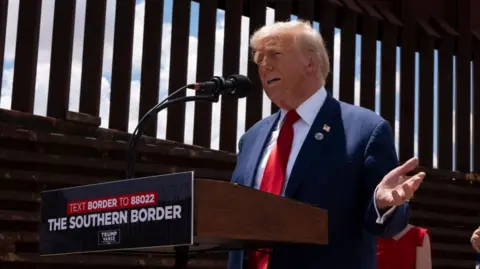What is the Insurrection Act?
 Getty Images
Getty ImagesOn his first day back in the White House, President Donald Trump signed an executive order declaring an emergency at the US southern border and directed his top officials to evaluate whether to invoke a rarely used 19th-century law to respond to that emergency.
The Insurrection Act of 1807 allows the president to use active-duty military personnel to perform law-enforcement duties inside the US.
The law has recently come up again, as Trump sends National Guard troops and Marines to the immigration-related protests in downtown Los Angeles, which he describes as violent, over the objections of the mayor and California governor.
"If there's an insurrection, I would certainly invoke it," Trump said on Tuesday. "We'll see."
Here's what to know.
What is the Insurrection Act of 1807?
The 19th-century law would allow the use of active-duty military personnel to perform law-enforcement duties within the US.
US presidents can invoke the law if they determine that "unlawful obstructions, combinations, or assemblages, or rebellion" against the government make it "impracticable to enforce" US law "by the ordinary course of judicial proceedings".
Once invoked, troops could be tasked with a range of duties, from quelling civil unrest and enforcing court orders to arresting and detaining migrants. This includes the National Guard - a branch of the US armed forces traditionally reserved for domestic emergencies and disasters.
Because the Insurrection Act was written in broad terms, with little specific guidance on how and when the powers can be used, it gives presidents wide latitude in deciding when to mobilise military personnel for domestic operations.
Why does Trump want to use it?
Throughout his election campaign, Trump vowed to crackdown on illegal immigration, calling the southern border situation a "national emergency" that could be better tamed by invoking the 19th-century statute.
On his first day in office in January, he asked for "recommendations regarding additional actions that may be necessary to obtain complete operational control of the southern border, including whether to invoke the Insurrection Act of 1807".
The administration has already rolled out a series of sweeping measures targeting the border. These include a nationwide deportation sweep and the controversial move to transfer alleged Venezuelan gang members to a prison in El Salvador - a decision now facing legal challenges.
This comes as US Border Patrol has recorded just 8,300 migrant apprehensions, marking the lowest number of border crossings since 2000.
How has it been used in the past?
The Insurrection Act has been invoked a handful of times in American history.
Abraham Lincoln used it when the southern states rebelled during the US Civil War, and former President Ulysses S Grant invoked it against a wave of racist violence by the Ku Klux Klan after the war.
In the 20th century, former President Dwight D Eisenhower invoked it so the US Army would escort black students into their high school in Little Rock, Arkansas, after the state's governor refused to comply with a federal desegregation order.
More recently, it was used in 1992 when massive riots broke out in Los Angeles over the acquittal of four white police officers in the beating of Rodney King, a black man. Then-President George Bush sent in active-duty members of the Marines and Army as well as National Guard troops.
Are there any limits on the law?
The US government has traditionally worked to limit the use of military force on American soil, especially against its own citizens.
The Posse Comitatus Act of 1878 was enacted to restrict the military from acting as domestic law enforcement. In times of unrest, states typically deploy the National Guard themselves to help maintain order.
Since returning to office, Trump has expanded his authority by declaring national emergencies - which gives the president access to powers and resources that are normally restricted. He has used this authority to impose tariffs and, more controversially, to take action on immigration.
In March, following his emergency declaration at the border, Trump invoked the rarely used Alien Enemies Act of 1798 to deport migrants he alleged were gang members. In April, the Supreme Court temporarily blocked that effort.
If Trump chooses to invoke the Insurrection Act, it remains unclear what legal challenges he might face.
